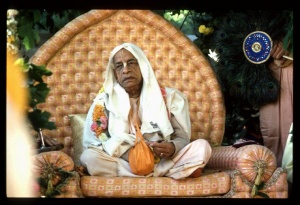SB 10.10.7: Difference between revisions
(Vanibot #0018 edit: make synonym terms in Sanskrit italic in SB - Vanisource) |
(Vanibot #0054 edit - transform synonyms into clickable links, which search similar occurrences) |
||
| Line 23: | Line 23: | ||
<div class="synonyms"> | <div class="synonyms"> | ||
''tau'' | ''[//vanipedia.org/wiki/Special:VaniSearch?s=tau&tab=syno_o&ds=1 tau]'' — the two boys of the demigods; ''[//vanipedia.org/wiki/Special:VaniSearch?s=dṛṣṭvā&tab=syno_o&ds=1 dṛṣṭvā]'' — seeing; ''[//vanipedia.org/wiki/Special:VaniSearch?s=madirā&tab=syno_o&ds=1 madirā]-[//vanipedia.org/wiki/Special:VaniSearch?s=mattau&tab=syno_o&ds=1 mattau]'' — very intoxicated because of drinking liquor; ''[//vanipedia.org/wiki/Special:VaniSearch?s=śrī&tab=syno_o&ds=1 śrī]-[//vanipedia.org/wiki/Special:VaniSearch?s=mada&tab=syno_o&ds=1 mada]-[//vanipedia.org/wiki/Special:VaniSearch?s=andhau&tab=syno_o&ds=1 andhau]'' — being blind with false prestige and opulence; ''[//vanipedia.org/wiki/Special:VaniSearch?s=sura&tab=syno_o&ds=1 sura]-[//vanipedia.org/wiki/Special:VaniSearch?s=ātmajau&tab=syno_o&ds=1 ātmajau]'' — the two sons of the demigods; ''[//vanipedia.org/wiki/Special:VaniSearch?s=tayoḥ&tab=syno_o&ds=1 tayoḥ]'' — unto them; ''[//vanipedia.org/wiki/Special:VaniSearch?s=anugraha&tab=syno_o&ds=1 anugraha]-[//vanipedia.org/wiki/Special:VaniSearch?s=arthāya&tab=syno_o&ds=1 arthāya]'' — for the purpose of giving special mercy; ''[//vanipedia.org/wiki/Special:VaniSearch?s=śāpam&tab=syno_o&ds=1 śāpam]'' — a curse; ''[//vanipedia.org/wiki/Special:VaniSearch?s=dāsyan&tab=syno_o&ds=1 dāsyan]'' — desiring to offer them; ''[//vanipedia.org/wiki/Special:VaniSearch?s=idam&tab=syno_o&ds=1 idam]'' — this; ''[//vanipedia.org/wiki/Special:VaniSearch?s=jagau&tab=syno_o&ds=1 jagau]'' — uttered. | ||
</div> | </div> | ||
Latest revision as of 18:20, 17 February 2024

A.C. Bhaktivedanta Swami Prabhupada
TEXT 7
- tau dṛṣṭvā madirā-mattau
- śrī-madāndhau surātmajau
- tayor anugrahārthāya
- śāpaṁ dāsyann idaṁ jagau
SYNONYMS
tau — the two boys of the demigods; dṛṣṭvā — seeing; madirā-mattau — very intoxicated because of drinking liquor; śrī-mada-andhau — being blind with false prestige and opulence; sura-ātmajau — the two sons of the demigods; tayoḥ — unto them; anugraha-arthāya — for the purpose of giving special mercy; śāpam — a curse; dāsyan — desiring to offer them; idam — this; jagau — uttered.
TRANSLATION
Seeing the two sons of the demigods naked and intoxicated by opulence and false prestige, Devarṣi Nārada, in order to show them special mercy, desired to give them a special curse. Thus he spoke as follows.
PURPORT
Although in the beginning Nārada Muni appeared very angry and cursed them, at the end the two demigods Nalakūvara and Maṇigrīva were able to see the Supreme Personality of Godhead, Kṛṣṇa, face to face. Thus the curse was ultimately auspicious and brilliant. One has to judge what kind of curse Nārada placed upon them. Śrīla Viśvanātha Cakravartī Ṭhākura gives herein a good example. When a father finds his child deeply asleep but the child has to take some medicine to cure some disease, the father pinches the child so that the child will get up and take the medicine. In a similar way, Nārada Muni cursed Nalakūvara and Maṇigrīva in order to cure their disease of material blindness.